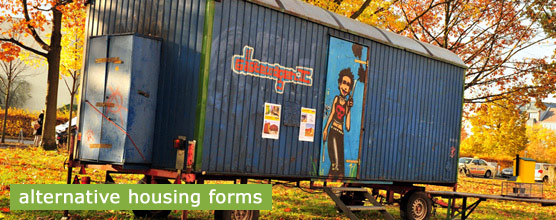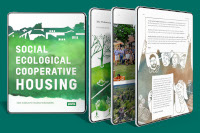Spreefeld, Spreeacker, Spree River, Teepee Land, Holzmarkt
Initiatives have been fighting to develop and maintain progressive cultural projects and affordable housing, increase public access to the Spree river, limit gentrification, …
This Spreefeld neighborhood with its emerging public Spree-Shore-Path is one of the most dynamic areas in the city regarding transformative projects. A “Mediaspree” plan proposed to bring in global investors and corporate headquarters – but was turned down by local activists and the population. Following this Spreefeld with id22 and others began to develop this neighborhood as an example of social and ecological sustainability.
But now, the last squats, diverse, accessible bars and a variety of projects are threatened by new office, hotel and housing developments. Local activists challenge you to consider the opportunities for a sustainable future. Explore a range of urban gardening and farming projects, alternative clubs, old and new collaborative housing projects and much more.
Kotti & Co
The tenants’ association Kotti & Co at Kottbusser Tor has come together to fight for their right to the city against the background of the history of immigration. They emerged in 2011 in a heterogeneous neighborhood in Berlin Kreuzberg to fight against high rents (including in social housing) and racism. In 2012, the initiative occupied the space in front of their large apartment buildings at Kottbusser Tor (Kotti) with a self-built wooden house (Gecekondu) and since then they have been protesting, among other things with noise demonstrations and the Gecekondu, against the displacement of tenants’ with low income from the inner city and the high rents in Berlin. The housing policy background of their struggle is the (unsocial and unsustainable) system of providing and maintaining affordable housing.
VOLLGUT, ALLTAG, CRCLR, TRNSFRM Cooperative, Impact Hub, Global Village, Stiftung Edith Maryon (Land Foundation)
The non-profit Edith Maryon Foundation acquired a large part of the site of the former Kindl brewery in the Rollberg district in 2015. A primary aim has been to make one of the large industrial wastelands in Neukölln available and secure for social, creative and ecological uses in the long term. This area well on its way to being an attractive place for living, working and learning and to positively contributing to the surrounding Rollbergkiez.
Accessibility and diversity, environmental sustainability and resource conservation are essential development criteria here, also involving the users and people from the area. Initially, two plots have been given in hereditary building rights (long-term leases) to the TRNSFRM eG (cooperative), which has already built the ALLTAG cohousing for special needs groups and neighborhood services – and across the public square a Circular Economy House for experimental living and working. The buildings are sustainably built. The One World Center, managed by Berlin Global Village e.V., is also located on the site.
VOLLGUT – Stiftung Edith Maryon
Refugio
The basic idea of Refugio is to develop community and give people opportunities to live, work and share together. For people with and without refugee experiences, and beyond. In Refugio Berlin, new and old Berliners live and work together on six floors. The first two floors are more for public life, with the Refugio Café and event venues such as the festival and conference hall, conference floor and catering kitchen. The private living and retreat areas of the residents are located on the three upper floors. Everything is crowned by a roof garden with a view of Neukölln. The buffer on the second floor is formed by creative studios including dance and other arts. To enrich the building, there are additional socially-oriented initiatives. Since Summer 2015, people looking for a new home and life in Berlin have been living and working in Refugio. This project, supported by the Berlin City Mission, is hoping to inspire others to develop more inclusive and affordable housing, for everyone.
Haus der Statistik, Alexanderplatz
To prevent the sale of the Haus der Statistik to private investors and its associated demolition, an art action was staged here in 2015. The initiative Haus der Statistik was formed, a civil society alliance of Berlin actors: Social and cultural institutions and associations, artists, activists and architects. Since 2016, it has organized public networking meetings for people interested in this neighborhood’s re-development. The impulse of the Initiative to re-use these very large, empty office buildings and add to them with sustainable new construction, turning this into a multifaceted place for culture, social affairs, administration, education and integrated living was taken up by politicians. In order to have a legal form for a contractual cooperation with potential partners, ZUsammenKUNFT Berlin – Genossenschaft für Stadtentwicklung (ZKB: an urban development cooperative) was founded.
Since 2018, the ZKB has been representing civil society in the “public-civic-cooperation” with four large Berlin municipal institutions in the Koop5. Together with the Senate Administration, the District Office of Berlin-Mitte and the state-owned companies Wohnungsbaugesellschaft Mitte (WBM: City Housing Company) and Berliner Immobilienmanagement (BIM: City Real Estate Company), ZKB is working towards a common-good-oriented development.
Prinzessinnengärten: Moritzplatz & Kollektiv
In 2009, the Prinzessinnengarten at Moritzplatz in Kreuzberg was founded, one of Berlin’s most famous and attractive community gardens and social spaces, on a former brownfield site in the middle of the city. The nearly 6000m² area not only contained countless raised beds but also supported urban bee colonies, a garden café, a learning kitchen for processing local harvests, and space for markets, workshops, and networking meetings of committed people interested in topics of participatory and sustainable urban design. In 2020, the Princess Gardens split into two different and independent projects.
1. Prinzessinnengarten Moritzplatz Kreuzberg is run as a self-organized inclusive community garden, open and acccessible for everyone in the neighborhood thanks to 100% volunteer work. Since February 2020, these gardens are managed by the non-profit association Common Grounds e.V. Events and actions include gardening, neighborhood soup kitchen, workshops, concerts and diverse, cultural and political actions.
Nachbarschafts- und Inklusionsgarten Moritzplatz
2. The Prinzessinnengarten Collective Berlin is building community gardens in the New St. Jacobi Cemetery in Berlin-Neukölln, inviting people to garden with them. Main project goals include promoting educational and participatory opportunities through open gardening days. Here, children, young people and adults are involved in the design and maintenance of the gardens.
prinzessinnengarten kollektiv berlin
Möckernkiez Genossenschaft / Möckernkiez Housing Cooperative
In 2009, the “Möckernkiez-Housing Cooperative: for self-organized, social and ecological housing” was founded. In 2018, the largest privately initiated cooperative housing project in Germany was completed with 471 apartments, many studios and commercial units. The cooperative, which now has more than 1,400 members, combines sustainable economic activity with extensive participation by residents. It shows a way for self-determined, intergenerational, holistic living. Inclusion plays an essential role in this.
The neighborhood is barrier-free throughout and free of car traffic. The entire Möckernkiez neighborhood with 14 residential buildings is sustainably built to passive building standards. Energy is supplied by an efficient combined heat and power plant. The common rooms, roof terraces on all buildings as well as playgrounds, garden courtyards and areas can be used by all residents. Community and neighborhood development are supported by regular meetings as well as various events, the self-organized cafe and a diverse range of workshops.



